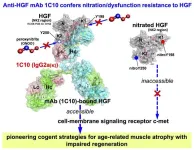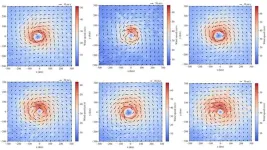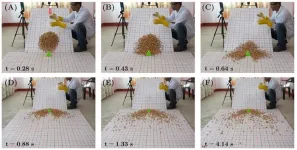(Press-News.org) Every fall, millions of Medicare beneficiaries have the chance to pick a new stand-alone prescription drug plan that may be better suited for them, but most stick with the same plan.
A new study published today in Health Affairs Scholar suggests that 52% of Medicare beneficiaries with stand-alone Part D plans did not switch because they made no plan comparisons at all for 2024. Many of these beneficiaries (41%) also reported not knowing how to switch plans.
“Comparing these Medicare Part D plans is hard, so many beneficiaries just don’t do it. But beneficiaries who don’t compare plans may not notice if they are sticking with more expensive plans or plans that are not optimal for their health conditions,” said lead author Wändi Bruine de Bruin, director of the Behavioral Science & Policy Initiative at the USC Schaeffer Institute for Public Policy & Government Service.
This study confirms a long-standing suspicion that beneficiaries with stand-alone Part D plans do not switch because they do not compare plans.
“Not surprisingly, my mother delegated her Medicare Part D decisions to me, her PhD health economist son,” said Dana Goldman, director of the Schaeffer Institute. “I paid close attention the first year. Eventually, the decisions became so complicated that I stopped comparing plans.”
The average beneficiary can choose from about 12 to 18 Part D plans that have varying deductibles, co-pays, access to drugs, pharmacy networks and other features which may change from year to year. Making an active choice may be especially important in the ongoing enrollment period for 2025 coverage, which runs through Dec. 7, due to premium increases in some plans, according to the healthcare policy research organization KFF.
For their study, researchers surveyed 439 Medicare beneficiaries with stand-alone Part D plans from the Understanding America Study at USC, a nationally representative sample of U.S. adults. The survey was conducted in the weeks immediately following the close of the 2024 enrollment period. Among their findings:
Nearly all of those who said they did not compare coverage options last year did not switch plans (98%). Among those who shopped around, 67% did not switch plans.
The 52% who said that they didn’t compare or switch plans were more likely than those who switched to say they perceived switching as difficult.
They were also more likely to report their existing plans were continued, had not been changed and were satisfactory. They were less likely to rely on plan advisors or the Medicare Plan Finder website, which allows people to compare coverage options based on personal need.
Beneficiaries who did compare plans but kept their coverage said that they didn’t find it hard to compare or switch. However, they reported receiving more mailed marketing, which consumers may find overwhelming, and they were less likely to have a college degree.
Previous research from study co-authors indicated that beneficiaries who did not switch plans risk ending up in plans that aren’t financially optimal, potentially resulting in overspending by hundreds of dollars or more per year. This overspending could have health consequences if people then try to manage their costs by limiting their use of prescribed medicines.
Recognizing that most beneficiaries often stay in the same plan, Part D insurers may be exploiting this complacency to boost profits, other researchers have found.
“Our research on Part D indicates that a common strategy is for plans to start with a low premium to attract enrollees and then take advantage of their inattention by raising premiums year after year,” said Erin Trish, co-director of the Schaeffer Center for Health Policy & Economics. “Since most beneficiaries don’t switch plans, they end up paying higher premiums than they need to.”
The study authors suggested that beneficiaries may welcome policies that reduce the need for shopping, such as auto-enrollment into an optimal plan or extending the coverage period from one year to multiple years. While those options may be politically challenging, policymakers could do more to make plan shopping less daunting for Medicare beneficiaries, said Bruine de Bruin, who is also Provost Professor of Public Policy, Psychology, and Behavioral Science at the USC Price School of Public Policy and the USC Dornsife Department of Psychology.
Bruine de Bruin said: “Policymakers often think that it is good to give people lots of choices because it makes companies compete to offer the best plans. But having lots of choices can be so overwhelming that people just stick with their old plan year after year, potentially at a major cost to themselves and the government.”
Read the release online here.
END
Most Medicare beneficiaries do not compare prescription drug plans – and may be sticking with bad plans
USC Schaeffer study finds over half with stand-alone Part D plans didn’t shop around during the last enrollment period, likely missing out on better coverage options.
2024-11-19
ELSE PRESS RELEASES FROM THIS DATE:
“What Would They Say?” video wins second place in international award for tobacco control advocacy
2024-11-19
DALLAS, Nov. 19, 2024 —“What Would They Say?” – the powerful spoken word poem produced on video by the American Heart Association, which is celebrating 100 years of lifesaving service as the world’s leading voluntary organization focused on heart and brain health, has taken second place in the 4th Annual Anthem Awards winning the Silver Award in the Education, Art & Culture Campaign - Non-Profit Community Engagement category. This international recognition celebrates the Association’s impactful work and historic commitment ...
Black Britons from top backgrounds up to three times more likely to be downwardly mobile
2024-11-19
Even when their parents are lawyers, doctors, or executives, Black Britons are substantially more likely to end up in working class jobs than their White peers, a new study from the University of Kent reveals.
Funded by the Leverhulme Trust, this research shows that Black men from the most advantaged families are three times more likely than White men from similar backgrounds to be in working class jobs beyond age 30. Black women are also twice as likely as White women to experience this kind of downward mobility. This is true even after removing ...
Developing an antibody to combat age-related muscle atrophy
2024-11-19
Fukuoka, Japan—We all age. And while humanity’s life expectancy has increased dramatically in the modern era, we still struggle with the inevitable health issues our bodies face as we get up in the years. For example, the decrease of muscle mass and function, leading to weakness and atrophy. This is a pressing concern in a super-aging society like Japan where—while people live longer—without proper muscle strength, quality of life can be drastically diminished.
In findings that may eventually lead to targeted ...
Brain aging and Alzheimer's: Insights from non-human primates
2024-11-19
“Brain aging is a biological process that comprehends degenerative, adaptive, and regenerative brain changes that elapse through maturity until the elderly.”
BUFFALO, NY- November 19, 2024 – A new review was published in Aging (listed by MEDLINE/PubMed as "Aging (Albany NY)" and "Aging-US" by Web of Science), on October 29, 2024, Volume 16, Issue 20, titled, ”Brain aging and Alzheimer’s disease, a perspective from non-human primates.“
In the review, Ferrer Isidro from the University of Barcelona and Reial Acadèmia de Medicina de Catalunya, explores the differences in ...
Can cells ‘learn’ like brains?
2024-11-19
Individual cells appear capable of learning, a behaviour once deemed exclusive to animals with brains and complex nervous systems, according to the findings of a new study led by researchers at the Centre for Genomic Regulation (CRG) in Barcelona and Harvard Medical School in Boston.
The findings, published today in the journal Current Biology, could represent an important shift in how we view the fundamental units of life.
“Rather than following pre-programmed genetic instructions, cells are elevated to entities equipped ...
How cells get used to the familiar
2024-11-19
A dog learns to sit on command, a person hears and eventually tunes out the hum of a washing machine while reading … The capacity to learn and adapt is central to evolution and, indeed, survival.
Habituation — adaptation’s less-glamorous sibling — involves the lessening response to a stimulus after repeated exposure. Think the need for a third espresso to maintain the same level of concentration you once achieved with a single shot.
Up until recently, habituation — a simple form of learning — was deemed ...
Seemingly “broken” genes in coronaviruses may be essential for viral survival
2024-11-19
Viruses are lean, mean, infection machines. Their genomes are tiny, usually limited to a handful of absolutely essential genes, and they shed extra genomic deadweight extremely fast.
Usually.
Coronaviruses, including SARS-CoV-2 (the virus that causes COVID-19), appear at first glance to be an exception. They have some extra “accessory” genes in addition to the usual minimal viral set, and scientists don’t know what most of them do. Scientists believe these extra genes must be doing something important, though, or they would be rapidly lost as the viruses evolved.
Now, University of Utah Health researchers have found that some of these viral genes have stuck around ...
Improving hurricane modeling with physics-informed machine learning
2024-11-19
WASHINGTON, Nov. 19, 2024 – Hurricanes, or tropical cyclones, can be devastating natural disasters, leveling entire cities and claiming hundreds or thousands of lives. A key aspect of their destructive potential is their unpredictability. Hurricanes are complex weather phenomena, and how strong one will be or where it will make landfall is difficult to estimate.
In a paper published this week in Physics of Fluids, by AIP Publishing, a pair of researchers from the City University of Hong Kong employed machine learning to more accurately model the boundary layer wind field of tropical cyclones.
In atmospheric science, the boundary layer ...
Seed slippage: Champati cha-cha
2024-11-19
WASHINGTON, Nov 19, 2024 – Champatis, the seeds of the Lapsi tree, are valued in Nepal for their medical, economic, social, and cultural significance. They are also popular among children as simple playthings. But for a group of physicists, these unique seeds—and the way they bounce and roll down slopes—could help them better understand landslides and avalanches, leading to research that could save lives.
In a study published this week in Physics of Fluids, by AIP Publishing, a team ...
Hospitalization following outpatient diagnosis of RSV in adults
2024-11-19
About The Study: In this cohort study of adults with outpatient medically attended-respiratory syncytial virus (RSV) infections from 3 large deidentified U.S. databases across 6 RSV seasons, approximately 1 in 20 adults experienced all-cause hospitalization within 28 days. The results of this study highlight the public health need for RSV prevention and treatment.
Corresponding Author: To contact the corresponding author, Joshua T. Swan, PharmD, MPH, email swan.joshua@gmail.com.
To access the embargoed study: Visit our For The Media ...
LAST 30 PRESS RELEASES:
Korea University, Stanford University, and IESGA launch Water Sustainability Index to combat ESG greenwashing
Molecular glue discovery: large scale instead of lucky strike
Insulin resistance predictor highlights cancer connection
Explaining next-generation solar cells
Slippery ions create a smoother path to blue energy
Magnetic resonance imaging opens the door to better treatments for underdiagnosed atypical Parkinsonisms
National poll finds gaps in community preparedness for teen cardiac emergencies
One strategy to block both drug-resistant bacteria and influenza: new broad-spectrum infection prevention approach validated
Survey: 3 in 4 skip physical therapy homework, stunting progress
College students who spend hours on social media are more likely to be lonely – national US study
Evidence behind intermittent fasting for weight loss fails to match hype
How AI tools like DeepSeek are transforming emotional and mental health care of Chinese youth
Study finds link between sugary drinks and anxiety in young people
Scientists show how to predict world’s deadly scorpion hotspots
ASU researchers to lead AAAS panel on water insecurity in the United States
ASU professor Anne Stone to present at AAAS Conference in Phoenix on ancient origins of modern disease
Proposals for exploring viruses and skin as the next experimental quantum frontiers share US$30,000 science award
ASU researchers showcase scalable tech solutions for older adults living alone with cognitive decline at AAAS 2026
Scientists identify smooth regional trends in fruit fly survival strategies
Antipathy toward snakes? Your parents likely talked you into that at an early age
Sylvester Cancer Tip Sheet for Feb. 2026
Online exposure to medical misinformation concentrated among older adults
Telehealth improves access to genetic services for adult survivors of childhood cancers
Outdated mortality benchmarks risk missing early signs of famine and delay recognizing mass starvation
Newly discovered bacterium converts carbon dioxide into chemicals using electricity
Flipping and reversing mini-proteins could improve disease treatment
Scientists reveal major hidden source of atmospheric nitrogen pollution in fragile lake basin
Biochar emerges as a powerful tool for soil carbon neutrality and climate mitigation
Tiny cell messengers show big promise for safer protein and gene delivery
AMS releases statement regarding the decision to rescind EPA’s 2009 Endangerment Finding
[Press-News.org] Most Medicare beneficiaries do not compare prescription drug plans – and may be sticking with bad plansUSC Schaeffer study finds over half with stand-alone Part D plans didn’t shop around during the last enrollment period, likely missing out on better coverage options.





